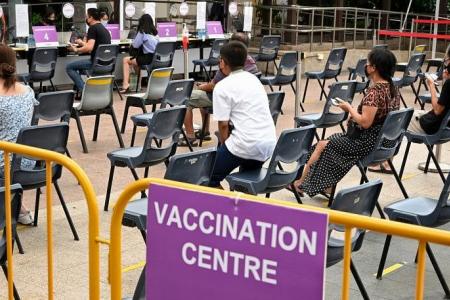People aged 50 to 59 can now take second Covid-19 vaccine booster
People aged 50 to 59 can now take a second Covid-19 vaccine booster shot if they wish to, by walking into any vaccination centre offering mRNA vaccines.
From July 1, medically vulnerable persons with certain health conditions will no longer require a doctor's referral to receive a second booster shot and may do so after declaring their conditions at any vaccination centre or public health preparedness clinics (PHPCs) and polyclinics that offer vaccination.
This group includes patients aged 18 and above with chronic conditions like diabetes, heart failure, asthma, liver cirrhosis, stroke and cancer under active treatment, among others. The full list of conditions is available on the Ministry of Health (MOH) website.
The ministry on Friday announced these updates to Singapore's vaccination programme, along with changes to other Covid-19 control measures.
Migrant workers living in dormitories will no longer need an exit pass to visit community areas from June 24, with the exception of four locations with high footfall: Chinatown, Geylang Serai, Jurong East and Little India.
Migrant workers who wish to visit these locations on Sundays and public holidays will have to apply for a visit pass. No pass is needed for visits to these areas on weekdays and Saturdays, or to other parts of Singapore on any days.
Up to 80,000 passes will be available in total on each Sunday or public holiday. For a start, there will be 30,000 issued for Little India; 20,000 for Jurong East; and 15,000 each for Chinatown and Geylang Serai.
From June 14, capacity limits for nightlife establishments with dancing among patrons will be lifted, and patrons will no longer need to obtain a negative antigen rapid test (ART) result to enter the venues.
This will bring the measures for the nightlife sector into line with other social settings, the MOH said.
However, vaccination-differentiated measures will continue to be applied, and operators will still be required to conduct checks on patrons' vaccination statuses.
Other changes include extending the private vaccination programme to everyone aged 18 and above in Singapore, including local residents and short-term visitors.
This will allow those who wish to take additional vaccine doses to do so at their own expense, even if they do not qualify to receive them for free under the national vaccination programme.
The subsidy policy for Covid-19 treatments will also be scaled back as Singapore continues to treat the virus as endemic.
From 12:01am on July 1, subsidies at PHPCs and polyclinics for the treatment of respiratory infections will revert to pre-pandemic levels.
This means the flat $5 to $10 fee for such infections will no longer apply, though Singaporeans may still get other subsidies under other schemes.
Telemedicine subsidies for those who are mildly symptomatic and recovering at home will also revert to pre-pandemic levels from 12:01am on July 1. This refers to people under the MOH's "Protocol 2" definition.
Those under "Protocol 1", who are at high medical risk or have severe symptoms but were discharged to a home setting, will continue to receive fully subsidised telemedicine care.
ART and polymerase chain reaction tests will also continue to be provided at PHPCs and polyclinics to eligible individuals with symptoms at no charge.
Emergency department charges for Singapore citizens, permanent residents and long-term pass holders with Covid-19 will also no longer be waived from 12:01am on July 1.
There are no changes to other measures such as mask-wearing, which will remain mandatory indoors.
Get The New Paper on your phone with the free TNP app. Download from the Apple App Store or Google Play Store now

